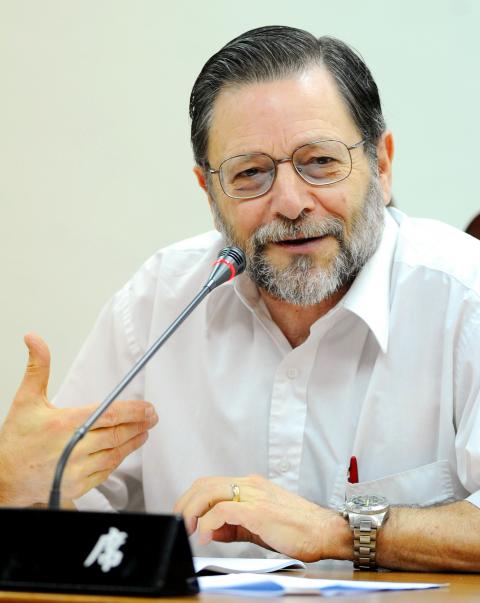Taiwan should focus on its colonial history and the issue of de-colonization, rather than the argument over independence and unification, an Australian academic told a symposium yesterday.
Bruce Jacobs, a professor at Monash University in Australia, discussed the democratization of Taiwan at a symposium held at the legislature and organized by Democratic Progressive Party (DPP Legislator Mark Chen (陳唐山), the Institute of National Defense and Strategy Research and the Association of Taiwan University Professors.
Taiwan is already an independent country and it should focus more on the study of decolonization and transitional justice, because the debate on independence and unification was pointless, Jacobs said.

Photo: Wang Yi-sung, Taipei Times
Citing a poll conducted at regular intervals by National Chengchi University’s Election Study Center, Jacobs said that more than 90 percent of Taiwanese supported either immediate independence or maintaining the “status quo” before moving toward future independence, while less than 2 percent favored immediate unification.
“The percentage who self--identify as Taiwanese exceeded 50 percent, not during the DPP administration, but after President Ma Ying-jeou (馬英九) came into office [in 2008]. To me that’s symbolic,” he said, adding that it implied the unification-independence debate was meaningless.
Jacobs, who was the first foreign academic to research vote-buying in Taiwan for his doctoral thesis in the 1970s, said Taiwanese should instead pay attention to its colonial past.
Observing the democratization process in Taiwan, Jacobs said there had been less violence in Taiwan than in other countries, and the 15 percent to 20 percent of swing voters, who make regime change possible, had made a great contribution to democracy.
Jacobs also said that while former president Chiang Ching-kuo (蔣經國) had “liberalized” Taiwanese politics, he “neither freed nor democratized” Taiwan.
“In my opinion, no Taiwanese president had democratized Taiwan until former president Lee Teng-hui (李登輝),” he added.
Like many countries, Taiwan needed to go through a period of decolonization and transitional justice before finding its true identity, he said.
A declaration of independence could result in war and was not necessarily in the best interest of Taiwanese, he said, adding that official diplomatic relations with other countries are not required to develop meaningful bilateral ties.
Speaking to a group of mainly independence supporters, Jacobs said: “I might offend some of you, but I have to say that the declaration of the establishment of the Republic of Taiwan might not put your in a better situation.”
“There are only four consolidated democracies in Asia — Japan, India, South Korea and Taiwan. Regardless of whether you like the current administration or not, democracy is a precious asset,” he said.
Leaders in Asian authoritarian regimes, such as China and Singapore, love to stress so-called “Asian values” and says that Western democracy is not suitable for Asians, but “we all know that is not true,” former National Security Council deputy secretary-general Parris Chang (張旭成) said.
Democracy and the fight for democracy are the best weapons Taiwanese had against the then-Chinese Nationalist Party (KMT) regime as well as Beijing today, because “both of them are afraid of democracy,” Chang said.

A preclearance service to facilitate entry for people traveling to select airports in Japan would be available from Thursday next week to Feb. 25 at Taiwan Taoyuan International Airport, Taoyuan International Airport Corp (TIAC) said on Tuesday. The service was first made available to Taiwanese travelers throughout the winter vacation of 2024 and during the Lunar New Year holiday. In addition to flights to the Japanese cities of Hakodate, Asahikawa, Akita, Sendai, Niigata, Okayama, Takamatsu, Kumamoto and Kagoshima, the service would be available to travelers to Kobe and Oita. The service can be accessed by passengers of 15 flight routes operated by

Chinese spouse and influencer Guan Guan’s (關關) residency permit has been revoked for repeatedly posting pro-China videos that threaten national security, the National Immigration Agency confirmed today. Guan Guan has said many controversial statements in her videos posted to Douyin (抖音), including “the red flag will soon be painted all over Taiwan” and “Taiwan is an inseparable part of China,” and expressing hope for expedited reunification. The agency last year received multiple reports alleging that Guan Guan had advocated for armed reunification. After verifying the reports, the agency last month issued a notice requiring her to appear and explain her actions. Guan

GIVE AND TAKE: Blood demand continues to rise each year, while fewer young donors are available due to the nation’s falling birthrate, a doctor said Blood donors can redeem points earned from donations to obtain limited edition Formosan black bear travel mugs, the Kaohsiung Blood Center said yesterday, as it announced a goal of stocking 20,000 units of blood prior to the Lunar New Year. The last month of the lunar year is National Blood Donation Month, when local centers seek to stockpile blood for use during the Lunar New Year holiday. The blood demand in southern Taiwan — including Tainan and Kaohsiung, as well as Chiayi, Pingtung, Penghu and Taitung counties — is about 2,000 units per day, the center said. The donation campaign aims to boost

The Central Weather Administration (CWA) said a magnitude 4.9 earthquake that struck off the coast of eastern Taiwan yesterday was an independent event and part of a stress-adjustment process. The earthquake occurred at 4:47pm, with its epicenter at sea about 45.4km south of Yilan County Hall at a depth of 5.9km, the CWA said. The quake's intensity, which gauges the actual effects of a temblor, was highest in several townships in Yilan and neighboring Hualien County, where it measured 4 on Taiwan's seven-tier intensity scale, the CWA said. Lin Po-yu (林柏佑), a division chief at the CWA's Seismological Center, told a news conference